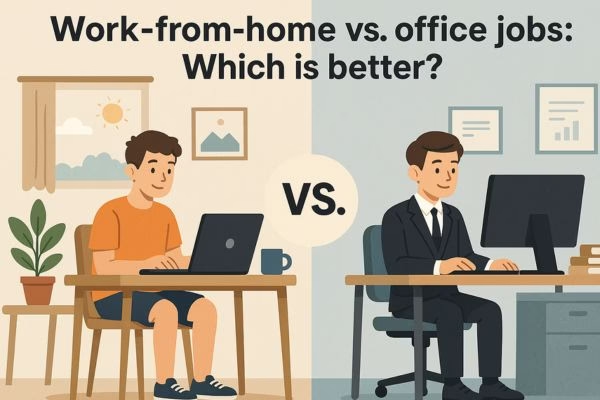The debate over Work-from-Home and office jobs has increased since the pandemic. While some employees thrive in remote settings, others miss the structure of an office. So, Work-from-Home vs. Office Jobs , which is better? The answer depends on job type, personality, and lifestyle preferences. To help you decide, let’s take a look at the pros and cons of each.
1. Flexibility & Work-Life Balance
Work-from-Home: Freedom with Responsibility
Pros:
No commute = More time for family, hobbies, or sleep.
Flexible schedules (e.g., early risers vs. night owls).
Custom workspace (comfortable, personalized environment).
Cons:
Blurred boundaries between work and personal life.
Distractions at home (kids, chores, Netflix temptations).
Isolation (lack of social interaction can affect mental health).
Office Jobs: Structured Routine
Pros:
Clear separation between work and home life.
Face-to-face collaboration (easier brainstorming & teamwork).
Networking opportunities (impromptu meetings, mentorship).
Cons:
Commuting stress (wasted time, traffic, costs).
Rigid schedules (less flexibility for personal needs).
Office politics & distractions (noise, unnecessary meetings).
2. Productivity & Performance
Work-from-Home: Self-Motivation is Key
Some studies show remote workers are 13% more productive (Stanford).
Less interruptions from coworkers.
But… Requires strong self-discipline—procrastination (delay, avoidance, stalling, hesitation, indecision) is a risk.
Office Jobs: Built-In Accountability
Manager oversight keeps employees on track.
Team synergy can boost creativity and problem-solving.
But… Open-office layouts may reduce focus due to noise.
3. Career Growth & Opportunities
Work-from-Home: Out of Sight, Out of Mind?
Remote workers may miss promotions due to less visibility.
Networking is harder without casual office interactions.
Freelancers & digital nomads thrive with global opportunities.
Office Jobs: Faster Advancement?
Easier mentorship from senior colleagues.
More visibility for leadership roles.
But… Limited to local job markets unless hybrid options exist.
4. Health & Well-Being
Work-from-Home: Comfort vs. Sedentary Risks
Less exposure to illnesses (no office colds!).
More time for exercise & healthy meals.
Risk of burnout from overworking without clear boundaries.
Office Jobs: Social but Stressful
Social interaction reduces loneliness.
Ergonomic setups (better posture than couch work).
Commuting fatigue increases stress levels.
5. Cost Considerations
Work-from-Home: Saves Money but Hidden Costs
✔ Savings: No commuting, eating out, or work wardrobe expenses.
✖ Costs: Home office setup (desk, internet, electricity).
Office Jobs: Higher Daily Expenses
✔ Perks: Free coffee, gym access, company-provided tech.
✖ Expenses: Gas, parking, lunches, professional attire.
Hybrid Work: The Best of Both Worlds?
Many companies now offer hybrid models (2-3 days in-office, rest remote). Benefits include:
Balance between collaboration & focus time.
Flexibility without full isolation.
Cost savings with fewer commuting days.
Final Verdict: It Depends on You!
Choose WFH if: You’re disciplined, value flexibility, and have a quiet workspace.
Choose Office if: You thrive on social interaction and need structured routines.
Hybrid may be ideal for those who want a mix of both.
What is your preference? when it comes to working from home or in an office? Share your opinions in the comments!








